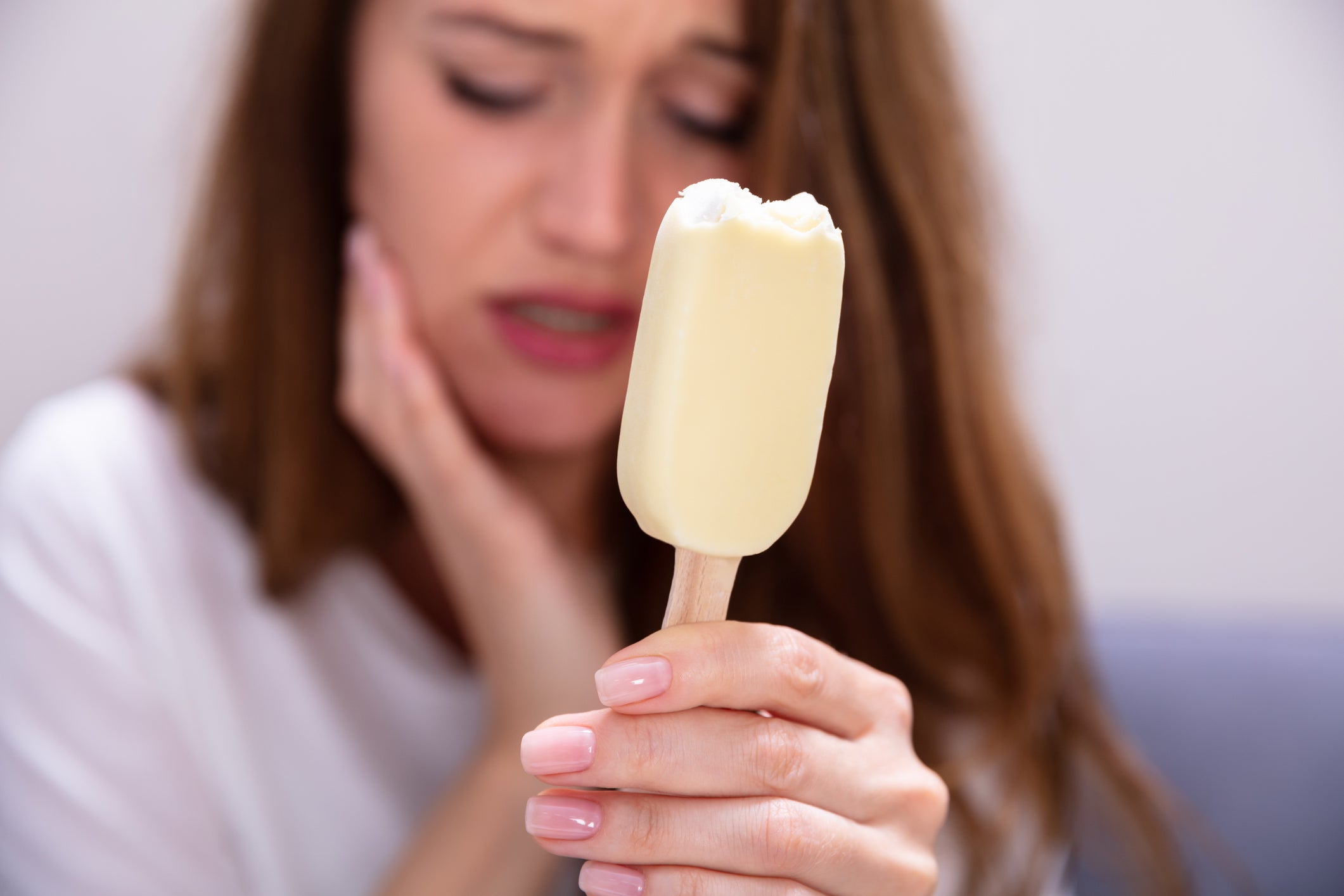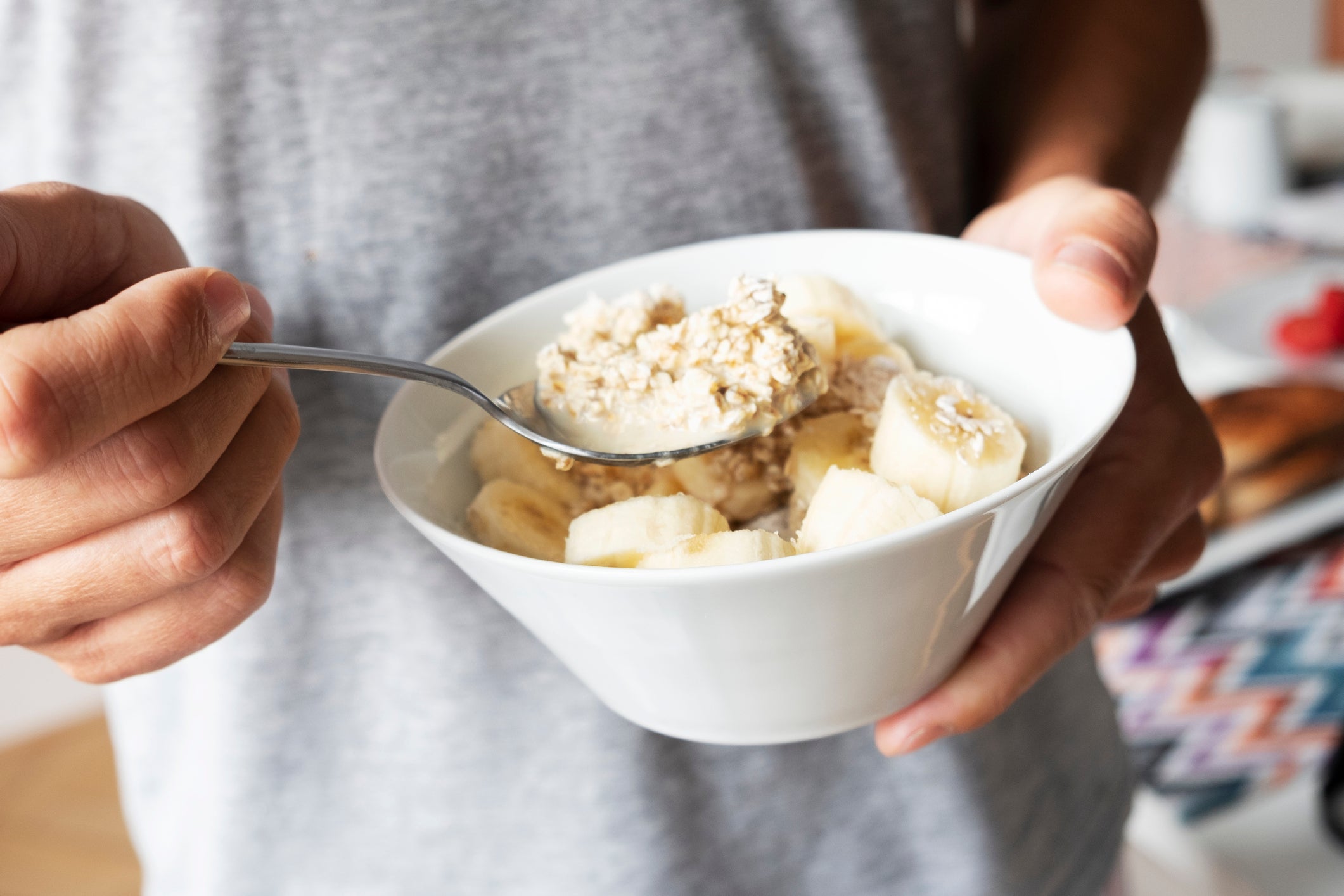-
Reasons Why your Teeth are Temperature Sensitive

Do you find that eating ice cream or drinking hot coffee causes pain in your teeth? You may have sensitive teeth. It’s a common condition, affecting about 45 million people in the United States, but it can be painful and difficult. What causes teeth to be temperature sensitive? More importantly, what can be done about it?
Your dentist can help you determine the underlying cause of the sensitivity, though the reason teeth become sensitive is typically always the same. Teeth are made of three layers, the enamel, the dentin, and the pulp. The enamel is the hard, outer layer of the teeth, and it protects the softer, inner layers. Below the enamel is the dentin, which is made up of microscopic tubes leading to the innermost layer- the pulp. Within that pulp is the nerve system of the teeth, and dental sensitivity happens when the dentin layers or the nerves are stimulated by something hot or cold. The cause of this stimulation varies.
Cold sensitivity can be caused by tooth decay or gum disease. It can also be the result of brushing too aggressively, using abrasive toothpaste, or using a hard-bristled toothbrush, which can all wear away at the enamel. Tooth grinding or clenching can chip the teeth or damage tooth enamel, which can also cause sensitivity to cold. Receding gums and cracks in a tooth can leave that tooth vulnerable to the cold. If your teeth are sensitive to heat, though, it could have a different cause. Dental treatments like teeth whitening can lead to heat sensitivity, and so can teeth cleanings, root planning, and dental crown or filling placement. If you consume a diet that’s high in acids, found in foods like coffee, tomato sauce, and wine, it can lead to enamel loss and heat sensitivity. People struggling with gum disease often have sensitive teeth, because 80 percent of tooth sensitivity begins at the gum line.
If your teeth are highly sensitive and react to both heat and cold, the best thing to do is see a dentist to determine the cause and the best course of treatment. If the sensitivity is minor, though, you may be able to manage it at home. You can reduce the discomfort of mild temperature sensitivity by making a few changes.
- Instead of letting hot and cold liquids touch your teeth, use a straw.
- Reduce your consumption of acidic foods.
- Change to a softer bristled brush and be careful not to brush too hard.
- Switch to a toothpaste for sensitive teeth.
- Ask your dentist which mouthwash to use; some mouthwashes can irritate your dentin and pulp layers.
- Wear a mouthguard to prevent teeth grinding at night.
There are also treatments that dentists offer to improve dental sensitivity. If you find that your sensitivity is not improving after a few days, talk to your dentist about the best treatment for you. It could be as simple as fluoride therapy, or it could be a more involved procedure like a root canal or a gum graft. Dental restorations like a filling, inlay, onlay or crown can also protect damaged teeth and help with sensitivity. Nervous about seeing the dentist? We provide sedation dentistry for your comfort.
If you are looking for a dentist to help with tooth sensitivity, it makes sense to choose the practice voted Best in New York. At Park 56 Dental Group, we offer pediatric, prosthodontics, endodontics, oral surgery, Invisalign®, emergency, and sedation dentistry, all at the highest level of treatment. We serve the Midtown, Central Park, Upper East Side, Park Avenue, and all surrounding Manhattan and New York areas, with a patient-centered practice that has hours to fit your schedule. Schedule your complimentary consultation today by contacting us online or calling us at (212) 826-2322.
-
Foods to Eat When You Have a Toothache

When you’ve got a toothache, one of the last things you want to do is eat. A tooth that’s throbbing is bad enough, but when you add chewing to the mix, it can be excruciating. Does this mean you are doomed to a liquid diet until you can see the dentist? Not necessarily. Here, we offer some strategies for reducing tooth pain, as well as recommendations about what to eat and not eat when your teeth are hurting.
First, let’s talk about toothaches themselves. Toothaches can happen for many reasons, including cavities and oral infections, but they can also be caused by dental procedures. Tooth extraction and oral surgery can cause pain during the recovery period, and even a cleaning can make your teeth feel sensitive and sore. Toothaches occur because the inner layer of the tooth, called the pulp, is inflamed, and gum inflammation can also cause tooth pain, because the gums surround the teeth. A toothache can feel sharp, throbbing, and sensitive, and you may experience a headache, fever, and a bad taste in your mouth at the same time.
Going to a dentist is the best course of action when you have a toothache, because sometimes toothaches can lead to more serious health conditions. However, there are some home remedies you can try to alleviate the pain while you are waiting for an appointment. A saltwater rinse may bring relief, or you could try a cold compress. Garlic, cloves, and peppermint tea have all been shown to reduce tooth pain, so you might want to give one of these tactics a shot.
There are also foods you can eat that won’t exacerbate the problem. Soft, easy to eat foods like bananas, applesauce, cottage cheese, mashed potatoes, scrambled eggs, and oatmeal are all good options if you have a toothache. Gelatin, puddings, custards, smoothies, and milkshakes can also be soothing, though ice cream is typically too cold to eat with a toothache. As long as it isn’t too warm or too cold, any soft food is a good option.
You will want to steer clear of any foods that are acidic or loaded with sugar. Avoid citrus fruits, tomatoes, raw vegetables, and anything spicy or salty. Things that are hard and crunchy or difficult to chew, like granola or meat, should be avoided. Hot coffee will likely be too painful to drink, and hard or sticky candy will cause more pain. Chewing ice should be avoided, because it’s not just hard on the teeth but also too cold to tolerate with a toothache.
The best thing to do when you have a toothache, of course, is to make an appointment with a highly skilled, experienced dentist. At Park 56 Dental Group, we offer pediatric, prosthodontics, endodontics, oral surgery, Invisalign®, emergency, and sedation dentistry, all at the highest level of treatment. We serve the Midtown, Central Park, Upper East Side, Park Avenue, and all surrounding Manhattan and New York areas, with a patient-centered practice that has hours to fit your schedule. Schedule your complimentary consultation today by contacting us online or calling us at (212) 826-2322.
-
Natural Tooth Pain Relievers

If you’ve got a toothache, it can be hard to think of anything else. You may not want to take time off and see your dentist immediately, but what can you do for the constant, throbbing pain? Here, we offer a list of natural tooth pain relievers, to give you a little bit of extra grace before you schedule an appointment to have your tooth examined and find the root cause of your toothache.
- Try a saltwater rinse. Mix ½ teaspoon of salt into a glass of warm water, and when the salt dissolves, rinse your mouth. Because salt water is a natural disinfectant, this can be an effective treatment, reducing inflammation and healing wounds in the mouth while also loosening particles that could be stuck between the teeth.
- Rinse with hydrogen peroxide. Hydrogen peroxide kills bacteria, and can also reduce plaque, heal bleeding gums, and reduce pain and inflammation. It is important to properly dilute the hydrogen peroxide, mixing 3 percent hydrogen peroxide with equal parts water. Swish it around your mouth but do not swallow it.
- A cold compress can alleviate pain. The cold causes blood vessels to constrict, as well as reducing swelling and inflammation. This can help relieve pain, and a cold compress is particularly helpful if your toothache is caused by trauma. Wrap a bag of ice in a towel and hold it to the area for 20 minutes at a time, reapplying every few hours.
- Peppermint tea can have a numbing effect. It’s especially effective to apply a used tea bag, cooled tea bag to the affected area, when it’s slightly warm. Alternately, put a used tea bag into the freezer for a few minutes, then use the bag as a cold compress, applying it to the tooth.
- Garlic has long been known to have medicinal properties. Garlic has antibacterial and antimicrobial properties, and it acts as a natural pain reliever, as well as killing bacteria. To help with a toothache, crush a garlic clove into a paste and apply it to the area, or slowly chew a fresh garlic clove. It has to be fresh garlic, because other forms of garlic don’t contain the allicin that gives garlic its healing properties. As effective as it is, though, garlic does have side effects. Aside from having garlic breath, you may experience bloating, body odor, upset stomach, heartburn, acid reflux, an allergic reaction, or burning in the mouth.
- Thyme has antibacterial and antioxidant properties. It can help to treat toothaches and fight the bacteria that contribute to tooth decay. To get these benefits, you can chew fresh thyme, dilute thyme essential oil in carrier oil and apply it to the painful area, or add a drop of oil to a glass of water and use it as mouthwash.
- Vanilla extract contains alcohol, which can numb pain. What’s more, vanilla has proven antioxidant properties, which facilitate healing. It has to be real vanilla, not imitation, and it works when applied directly to the afflicted area.
- Clove is an ancient toothache remedy. Clove oil numbs pain and reduces inflammation, because it contains eugenol, a natural antiseptic. Dilute the clove oil with a carrier oil like jojoba or sunflower oil, using about 15 drops of clove oil to one ounce of the other oil. Be careful not to swallow it, but just apply the diluted clove oil to your mouth with a cotton ball. A drop of clove oil in a glass of water can also make an effective mouthwash.
- There is actually a plant called a toothache plant. A flowering plant that thrives in tropical and subtropical regions, the toothache plant contains spilanthol, a compound with anti-inflammatory properties. Chewing this plant can numb your mouth, but you shouldn’t use it if you are allergic to daisies, have prostate cancer, use diuretics or drink alcohol, or are pregnant.
- Guava leaves can help heal wounds. They have both anti-inflammatory and antimicrobial properties that are useful in helping with a toothache. To reap the benefits, chew fresh guava leaves or make a mouthwash by boiling guava leaves in water.
- Wheat grass has healing properties. Nutrients found in wheatgrass, including chlorophyll, provide anti-inflammatory, immune-boosting, and bacteria-fighting properties. You can use wheatgrass as a mouthwash but, unlike other mouthwashes, you can also drink it.
- Aloe vera can reduce pain and swelling in the mouth. It has both anti-inflammatory and antioxidant properties and can reduce pain and swelling. If you are taking medication to control blood sugar, though, talk to your doctor before using aloe vera, because it can potentially lower blood glucose to an unsafe level.
These home remedies can help, but the best thing to do for toothache is to see your dentist. A dentist can determine the cause of your toothache and come up with the best plan for treatment. At Park 56 Dental Group, we offer pediatric, prosthodontics, endodontics, oral surgery, Invisalign®, emergency, and sedation dentistry, all at the highest level of treatment. We serve the Midtown, Central Park, Upper East Side, Park Avenue, and all surrounding Manhattan and New York areas, with a patient-centered practice that has hours to fit your schedule. Schedule your complimentary consultation today by contacting us online or calling us at (212) 826-2322.
-
Can a toothache cause problems to the rest of your body?

We know that the health of your mouth has an impact on your overall health, but does pain in your mouth cause problems for your body? When you have a toothache, it can certainly feel like your whole body is involved! Your head may throb, your heart may race, and you may feel nauseous or just generally sick. Is it all in your imagination?
In a word, no. A common cause of a toothache is tooth infection, and a tooth infection can definitely affect your whole body. Tooth infections happen when bacteria enter the tooth because of a chip or a cavity, and infections can lead to an abscess at the root of the tooth. An abscess causes constant, throbbing pain that can radiate to the jawbone, neck, or ear, along with bad breath, a bad taste in the mouth, and increased sensitivity to hot and cold foods.
Left untreated, the bacteria that caused your tooth infection can begin to spread throughout your body. If it spreads to the blood, it can cause sepsis, with symptoms that include an extremely high fever, respiratory trouble, and mental confusion. Your blood pressure may drop, causing you to go into septic shock, and in the worst case scenario, you could die. Another life-threatening condition that can result from a tooth infection is meningitis, which occurs because of inflammation near the brain and spinal cord. Ludwig’s Angina can also be caused by a tooth infection, bringing symptoms of pain and tenderness under the tongue, trouble swallowing, breathing, and speaking, swelling and redness of the neck, neck and ear pain, drooling, fever, chills, fatigue, confusion, and weakness. To avoid any of these complications and illnesses, it’s important to seek prompt medical treatment for a tooth infection. To prevent tooth infections, practice good oral hygiene, eat a nutrient-dense diet, and see your dentist regularly.
You don’t necessarily have to have a tooth infection to have your tooth pain affect other parts of your body. Because of a shared nerve, tooth pain can cause head pain. If you grind your teeth, it can cause muscle stress that results in both a toothache and a headache, and these can also both be caused by a sinus infection or TMJ (temporomandibular joint dysfunction). If your tooth hurts due to a cavity, crack, or impaction, you may get a migraine. It is thought that the connection between tooth pain and migraines has to do with a cranial nerve called the trigeminal nerve, which provides feeling to the face, including the mouth. Pain from a toothache can irritate this nerve and trigger a migraine.
If you have a toothache, don’t put off seeing an experienced dentist, who can determine the source of your pain and prevent it from affecting the rest of your body. At Park 56 Dental Group, we offer pediatric, prosthodontics, endodontics, oral surgery, Invisalign®, emergency, and sedation dentistry, all at the highest level of treatment. We serve the Midtown, Central Park, Upper East Side, Park Avenue, and all surrounding Manhattan and New York areas, with a patient-centered practice that has hours to fit your schedule. Schedule your complimentary consultation today by contacting us online or calling us at (212) 826-2322.
RECENT POSTS
categories
- Uncategorized
- Cosmetic Dentistry
- Veneers
- Healthier Teeth
- Teeth Whitening
- Dental Health
- Video
- Dental Emergencies
- Invisalign
- Dental Implants
- Root Canal
- Sedation Dentistry
- Infographic
- Dental Crowns and Bridges
- Dental Anxiety
- Gum Disease
- COVID-19
- Bad Breath
- New York Dentist
- Cut out sugar
- General Dentistry
- Oral Health
- Oral Cancer
- Dry Mouth
- Gum Health
- Toothache
- Dental Sealants
- Cavities
